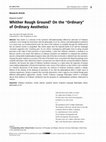Papers by Edward Guetti

Open Philosophy, 2023
This article is a criticism of the narrative self-understanding offered by advocates of Ordinary ... more This article is a criticism of the narrative self-understanding offered by advocates of Ordinary Aesthetics. Even though the frustration with the philosophy of art (in contrast with philosophical aesthetics) is, in many ways, an overdetermined result, the sense of the ordinary as available through the withdrawal of this art-centred concern is misguided. This article argues that the reported death of art and the seemingly consistent suggestion that "anything goes" do not relieve contemporary philosophy from its being situated precisely in the wake of these practices of sense-making. I claim that Ordinary Aesthetics is dealing in an illusory conceit to the extent that defences of Ordinary Aesthetics are indebted to a demand that aesthetics may be a living field of philosophical inquiry today only if the fate of artworks is deleted from that narrative. Arguing this point requires an account of the idea of the death of art, associated with Hegel but perhaps more recently with Danto, and I sketch how Danto's account does not cohere with the account provided in Ordinary Aesthetics. But because the claim of Ordinary Aesthetics amounts to a claim about the capacities of human sense-making independent of historical trajectories and a sense of the ordinary as that which is just available to a timeless abstraction of the human sensorium, my criticism of Ordinary Aesthetics requires a deeper defence of the relation of the faltering of narratives of art with the philosophical effort to make sense of ordinary experiences. Doing so requires that I provide alternatives: what I regard as two related though quite different philosophical approaches, namely, Cavell's Ordinary Language Philosophy (which is startlingly absent from defences of Ordinary Aesthetics) and the program of a philosophical aesthetics elaborated in Adorno.
Philosophies, 2023
This article is an open access article distributed under the terms and conditions of the Creative... more This article is an open access article distributed under the terms and conditions of the Creative Commons Attribution (CC BY

Questões Ecológicas em Perspectiva Interdisciplinar. Vol. 2, Apr 21, 2022
In order to understand the necessity of interdisciplinary and intersectional research for shaping... more In order to understand the necessity of interdisciplinary and intersectional research for shaping a sustainable future, I consider competing interpretations of the Ecological Question and the corresponding drawbacks that become apparent in the light of recent studies and developments in sustainability policy. In particular, it is imperative to insist that any proposed visions of a "sustainable" future be evaluated through their capacity to alleviate inequities that have been sustained and historically made more disparate by actual conditions of production. This conception of sustainability which the UN has interpreted as the demand to "Leave No One Behind." Such a conception requires a criticism of the prevailing modes of affirming inequity in the familiar status quo of contemporary forms of life. I turn to a recent articulation of Critical Theory in the Frankfurt School tradition, Rahel Jaeggi's Critique of Forms of Life, to establish a place for Critical Theory in the Anthropocene. Although I support her account of the sorts of problems that immanent critique must address, I argue that Jaeggi's framing of these problems is misaligned with the prevailing dynamics of the climate crisis. I then elaborate my own account, rooted in a reading of Walter Benjamin's Theses on the Concept of History, which can provide the basis of an interdisciplinary and intersectional critique of the climate crisis while also advocating forms of equitable sustainability that "Leave No One Behind."

This essay focuses on the explosive claim Cavell inserts in the middle of The Claim of Reason tha... more This essay focuses on the explosive claim Cavell inserts in the middle of The Claim of Reason that a narrative history of a certain style of philosophy should be called “Philosophy and the Rejection of the Human.” In order to understand the accusation, I shape interpretations of what Cavell means by nearly each of the terms of this dramatic sentence. I begin by comparing senses of “philosophy” by way of a comparison with Rorty’s critical review of The Claim of Reason; I proceed by underlining how, in Cavell’s work, the notion “human” and its rejection also is entangled with that which Cavell describes as “skepticism.” It is necessary, therefore, to understand whether there is a specific characteristic difference between skepticism and the style of philosophy that is implicated in the “rejection of the human.” It seems as if there should be a difference, given Cavell’s notorious approval of the truth or the moral of skepticism and the apparent criticism of the philosophical style tha...
There are two modes for interpreting Maya Da-Rin's The Fever (2019, A Febre): the first, a "surfa... more There are two modes for interpreting Maya Da-Rin's The Fever (2019, A Febre): the first, a "surface" reading of the pressures of assimilation faced by a small family of indigenous Desana descent who live on the outskirts of Manaus; the film also provides the lineaments of a metaphysical doctrine of Amerindian metaphysics and provides a pathway for applying this metaphysical doctrine within the social formations of international capitalism. In this paper, I provide sketches of both readings and focus on the themes of identity, the distinction between form and substance (including a fetishism at the heart of this distinction), and the film's ambiguous portrayal of the threats facing the local community and the film's protagonist.

In order to understand the necessity of interdisciplinary and intersectional research for shaping... more In order to understand the necessity of interdisciplinary and intersectional research for shaping a sustainable future, I consider competing interpretations of the Ecological Question and the corresponding drawbacks that become apparent in the light of recent studies and developments in sustainability policy. In particular, it is imperative to insist that any proposed visions of a "sustainable" future be evaluated through their capacity to alleviate inequities that have been sustained and historically made more disparate by actual conditions of production. This conception of sustainability which the UN has interpreted as the demand to "Leave No One Behind." Such a conception requires a criticism of the prevailing modes of affirming inequity in the familiar status quo of contemporary forms of life. I turn to a recent articulation of Critical Theory in the Frankfurt School tradition, Rahel Jaeggi's Critique of Forms of Life, to establish a place for Critical Theory in the Anthropocene. Although I support her account of the sorts of problems that immanent critique must address, I argue that Jaeggi's framing of these problems is misaligned with the prevailing dynamics of the climate crisis. I then elaborate my own account, rooted in a reading of Walter Benjamin's Theses on the Concept of History, which can provide the basis of an interdisciplinary and intersectional critique of the climate crisis while also advocating forms of equitable sustainability that "Leave No One Behind."

Journal of the History of Analytic Philosophy, 2021
Cavell and the "History of the Rejection of the Human" Edward Guetti This essay focuses on the ex... more Cavell and the "History of the Rejection of the Human" Edward Guetti This essay focuses on the explosive claim Cavell inserts in the middle of The Claim of Reason that a narrative history of a certain style of philosophy should be called "Philosophy and the Rejection of the Human." In order to understand the accusation, I shape interpretations of what Cavell means by nearly each of the terms of this dramatic sentence. I begin by comparing senses of "philosophy" by way of a comparison with Rorty's critical review of The Claim of Reason; I proceed by underlining how, in Cavell's work, the notion "human" and its rejection also is entangled with that which Cavell describes as "skepticism." It is necessary, therefore, to understand whether there is a specific characteristic difference between skepticism and the style of philosophy that is implicated in the "rejection of the human." It seems as if there should be a difference, given Cavell's notorious approval of the truth or the moral of skepticism and the apparent criticism of the philosophical style that rejects the human. I show that the difference can be discovered by focusing on Cavell's understanding of criteria. In particular, I emphasize the (open) space of a subject's relation to criteria, a subjective claim to universality without objectivity, in pursuing and extending Cavell's own appeal to Kant's Critique of Judgment. It is this subjective component that is rejected in the style of philosophy that Cavell singles out.
Journal of the History of Analytic Philosophy (Special Issue on Stanley Cavell), 2021
Center for Philosophy and Critical Thought, Goldsmiths, 2021
Film Criticism, Michigan University Press, 2020
Pedro Costa’s most recent movie — Vitalina Varela (2019) — should be understood as breaking away ... more Pedro Costa’s most recent movie — Vitalina Varela (2019) — should be understood as breaking away from the hauntological structure that characterizes his previous films centered around the lives of Cape Verdean immigrants in Lisbon. It is necessary to understand the weight that gathers in the previous films of Costa’s depictions of the lives of Cape Verdeans in Lisbon to understand how Vitalina Varela herself refuses this primarily male articulation of being haunted by the undoing of the future and to understand how this involves a refusal of the proffered melancholic forms of mediation. The best place to locate this weight, against which Vitalina’s refusal can be most clearly seen, is against background discussions of hauntology and in the characters played by Ventura in Vitalina Varela, Cavalo Dinheiro, and Juventude em Marcha
The Epistemology of Religious Belief, Oxford University Press (forthcoming), 2022
Wittgenstein Studien, De Gruyter, 2018
In this essay I try to sketch the difficulties that face anyone writing about Wittgenstein’s late... more In this essay I try to sketch the difficulties that face anyone writing about Wittgenstein’s later method. I then insist that an underappreciated remark of his be taken seriously: that his method be seen as natural-historical. There are several difficulties that result from taking this stance, and I believe I address each of them after developing a fuller picture of what a “natural-historical method” will mean (and here I am broadly following lines laid out by Michael Thompson). I conclude with literary examples (Sebald’s Austerlitz and his Rings of Saturn) in order to exemplify further the recuperative and fantasy-defeating potential of a natural-historical method akin to Wittgenstein’s.
Conference Presentations by Edward Guetti
My presentation, "Once Out of Nature: Narrativity, Amerindian Perspectivism, and the Politics of ... more My presentation, "Once Out of Nature: Narrativity, Amerindian Perspectivism, and the Politics of Anthropocene Aesthetics", available upon request.
Conference, Sapienza Università di Roma
QUESTÕES ECOLÓGICAS EM PERSPECTIVA INTERDISCIPLINAR











Uploads
Papers by Edward Guetti
Conference Presentations by Edward Guetti